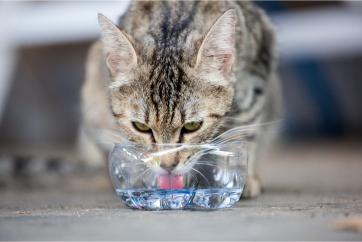
It’s summertime here in Los Angeles, and the California sun means business. While you might be sipping plenty of things to keep you well hydrated, it is easy to forget about your pets. Shiloh Veterinary Hospital wants to help ensure that you stay on top of your feline hydration game so you and your pet can enjoy the season.
Dehydration in Cats
Hydration is the amount of water we have in our bodies at any given time. Keeping the body well hydrated is very important to make sure many physiological processes occur optimally. Adequate hydration is essential in order to:
- Digest food
- Regulate body temperature
- Keep electrolyte levels balanced
- Lubricate the joints
- Deliver nutrients and oxygen throughout the body
- Create essential bodily fluids like sweat, urine, bile, feces, and saliva
If dehydration in cats or any other animal occurs, many problems can ensue. Decreased circulation can affect the major organs and create potentially life-threatening changes.
When a cat becomes dehydrated, you may notice increased lethargy or weakness, a poor appetite, tacky mucous membranes, sunken eyes, and decreased skin elasticity.
Certainly outdoor temperature and conditions can lead to and contribute to feline hydration status, but systemic health issues like chronic kidney disease, digestive problems, or diabetes can also lead to dehydration in cats.
Optimizing Feline Hydration
Keeping hydrated is so important, but how can you help your cat stay quenched?
On average, cats need to drink about 4 ounces of water per five pounds of lean body weight daily. This translates to a 10 pound cat drinking about a cup of water per day. Keep in mind that consuming canned food, which contains up to 80% water, contributes to this number.
Keep your kitty cool this summer by encouraging water intake with some of our favorite tips:
- Provide flowing water in the form of a faucet or fountain as cats tend to prefer moving water
- Keep water offerings fresh, clean, and cool
- Place water sources in easy access areas
- Add a little wet food into the mix
- Flavor water with a small amount of tuna juice or low sodium chicken broth (offer a plain alternative as well)
Of course, if you suspect that your cat might already be dehydrated, it is best to contact us. Depending on how severe things are, medical treatment may be in order. There may also be underlying causes of the dehydration that need to be addressed.
Keeping your cat well hydrated this summer (and every season) is a great way to support their overall health. Wellness and preventive care are important for all animals, and our feline friends are no different.
